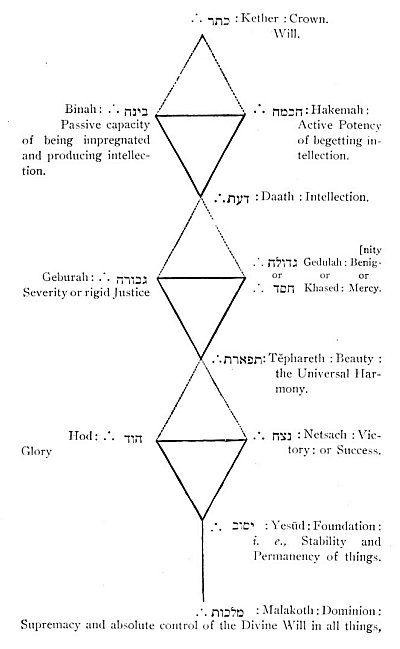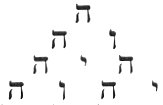That one Reason and one Will created and governed the Universe was too evident not to be at once admitted by the philosophers of all ages. It was the ancient religions that sought to multiply gods. The Nature of the One Deity, and the mode in which the Universe had its beginning, are questions that have always been the racks in which the human intellect has been tortured: and it is chiefly with these that the Kabalists have dealt.
It is true that, in one sense, we can have no actual knowledge of the Absolute Itself, the very Deity. Our means of obtaining what is commonly termed actual knowledge, are our senses only. If to see and feel be knowledge, we have none of our own Soul, of electricity, of magnetism. We see and feel and taste an acid or an alkali, and know something of the qualities of each; but it is only when we use them in combination with other substances, and learn their effects, that we really begin to know their nature. It is the combination and experiments of Chemistry that give
p. 739
as a knowledge of the nature and powers of most animal and vegetable substances. As these are cognizable by inspection by our senses, we may partially know them by that alone: but the Soul, either of ourself or of another, being beyond that cognizance, can only be known by the acts and words which are its effects. Magnetism and electricity, when at rest, are equally beyond the jurisdiction of the senses; and when they are in action, we see, feel, hear, taste, and smell only their effects. We do not know what they are, but only what they do. We can know the attributes of Deity only through His manifestations. To ask anything more, is to ask, not knowledge, but something else, for which we have no name. God is a Power; and we know nothing of any Power itself, but only its effects, results, and action, and what Reason teaches us by analogy;
In these later days, in laboring to escape from all material ideas in regard to Deity, we have so refined away our notions of GOD, as to have no idea of Him at all. In struggling to regard Him as a pure immaterial Spirit, we have made the word Spirit synonymous with nothing, and can only say that He is a Somewhat, with certain attributes, such as Power, Wisdom, and Intelligence. To compare Him to LIGHT, would now be deemed not only unphilosophical, but the equivalent of Atheism; and we find it necessary to excuse and pity the ancients for their inadequate and gross ideas of Deity, expressed in considering Him as the Light-Principle, the invisible essence or substance from which visible Light flows.
Yet our own holy writings continually speak of Him as Light; and therefore the Tsabeans and the Kabala may well be pardoned for doing the same; especially since they did not regard Him as the visible Light known to us, but as the Primordial Ether-Ocean from which light flows.
Before the creation, did the Deity dwell alone in the Darkness, or in the Light? Did the Light co-exist with Him, or was it created, after an eternity of darkness? and if it co-existed, was it an effluence from Him, filling all space as He also filled it, He and the Light at the same time filling the same place and every place?
MILTON says, expressing the Hebraic doctrine:
“Hail, Holy Light, offspring of Heaven first-born, Or of th’ Eternal, co-eternal beam! May I express thee unblamed, since God is Light.
p. 740
And never but in unapproached Light Dwelt from Eternity; dwelt then in Thee,
Bright effluence of bright Essence uncreate.”
“The LIGHT,” says the Book Omschim, or Introduction to the Kabala, “Supremest of all things, and most Lofty, and Limitless, and styled INFINITE, can be attained unto by no cogitation or speculation; and its VERY SELF is evidently withdrawn and removed beyond all intellection. It WAS, before all things whatever, produced, created, formed, and made by Emanation; and in it was neither Time, Head, or Beginning; since it always existed, and remains forever, without commencement or end.”

Moe is the founder of GnosticWarrior.com. He is a father, husband, author, martial arts black belt, and an expert in Gnosticism, the occult, and esotericism.






